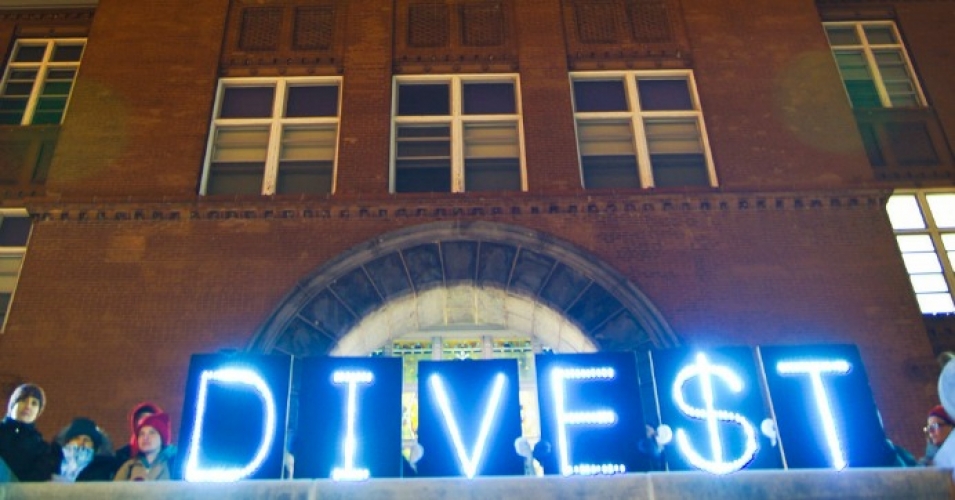This column was co-written by Matt Remle, editor of Last Real Indians and Co-Founder of MazaskaTalks.org.
After the Trump administration’s reckless decision to exit the Paris climate agreement, many people are looking to divest their money from fossil fuels as a way to fight back. Fuel for their fire is last week’s federal court ruling on the inadequacy of the Army Corps’ environmental review of the Dakota Access Pipeline (DAPL), which provides renewed leverage against the banks that fund it and other climate-destroying pipelines.
Earlier this month, we were pleased to join 15 leading national social change organizations representing 13 million members, and announce that we too are divesting organizational money from ‘pipeline banks’ and instead choosing to bank in alignment with our social values.
Millions of people around the world, as well as major cities like Seattle and New York have called out the bad actions of big Wall Street banks like Wells Fargo. But for far too long, even the most progressive environmental groups in this country have continued to lend our money, and by extension our moral support, to the same banks funding the dig-dump-burn economy that we work day in and day out to replace. No more.
Just like we’re all charged with being good stewards of our planet, our job as leaders in the environmental movement is to be good stewards of these organizations. By refusing to do business with banks financing risky fossil fuel infrastructure projects like the DAPL, Keystone XL and others, we’re saying loud and clear that you can’t bank with Wells, Citi, TD and more without banking on climate destruction.
We’re also encouraging all groups’ members and supporters - more than 13 million worldwide - to take a look at their own finances, including where you’re invested, where your bank is invested, how you spend your disposable income, and look for greener alternatives. We know that switching banks or saving for retirement are big, long-term decisions for every person and family. They are for our groups too. Fortunately a growing number of online resources exist to help account holders identify alternatives like small and medium-sized banks, credit unions, CDCUs and CDFIs that support a clean and equitable energy transition, local economic development, fair housing, sustainable food systems, and more.
According to Shorting the Climate, a report documenting big bank support for fossil fuel infrastructure, the top global and US banks provided $785 billion for fossil fuel infrastructure such as coal and tar sands development from 2013 through 2015. We are taking action to ensure that banks do not continue to finance and lock in infrastructure that works in direct conflict with the Paris Climate Agreement objectives.
Our divestment decisions make an impact. After recent bank protests turned up the heat, several banks dropped their DAPL investments. US Bank agreed to revisit their financing of future fossil fuel projects and the CEO of CitiBank apologized to a pair of indigenous women at their Shareholder meeting.
If you’re ready to join us in taking action, here’s what to do: First, visit petitions.signforgood.com/defundpipelines and sign on to the global call to the biggest banks funding Tar Sands expansion in North America. Nearly 150,000 individuals representing more than $4 billion in assets have already pledged to divest from these banks. Next, take control of your money and own what you own: check out options to bank with a fossil free national bank like Amalgamated or Aspiration, and look into local credit unions and CDFIs that may be low-carbon, fossil free and will keep your dollars in the local economy. Last - sign up to #RESIST locally, nationally and globally. Join one of our organizations as a volunteer, donate to a local chapter, and get together with friends and neighbors to pressure local elected officials like your mayor, comptroller, or county council to divest from fossil fuels and invest in a clean energy future.
Together, we can take back our economy, and build a sustainable future for all.
---------
The 15 U.S.-based organizations announcing their divestment of funds from pipeline banks are: 350.org, Climate Hawks Vote, CREDO, Earth Guardians, Friends of the Earth, Green America, Honor the Earth, Institute for Policy Studies, League of Conservation Voters, The Hip Hop Caucus, Oil Change International, Potlach Fund, Rainforest Action Network, the Sierra Club, and the US Climate Action Network (USCAN).
The 17 banks behind Dakota Access and the four new proposed tar sands pipelines (Keystone XL, Trans Mountain, Line 3, and Energy East) are: Bank of America, Barclays, Citi, Crédit Agricole, Credit Suisse, Deutsche Bank, JP Morgan Chase, Mizuho, MUFG, RBC, SMBC, ScotiaBank, TD Bank, Wells Fargo, CIBC, BNP Paribas, Bank of Montreal. Those in bold finance all of these companies.
